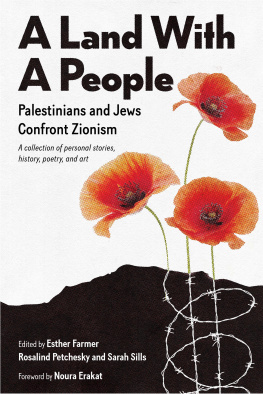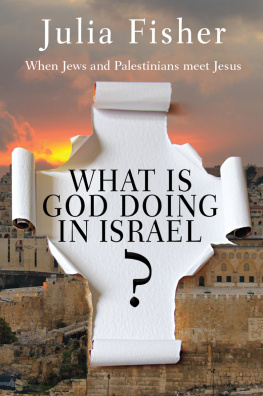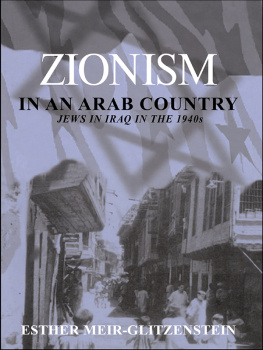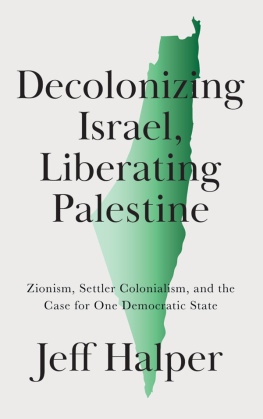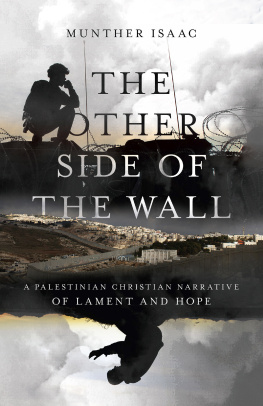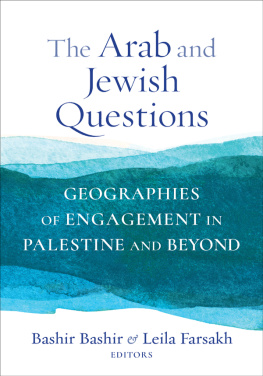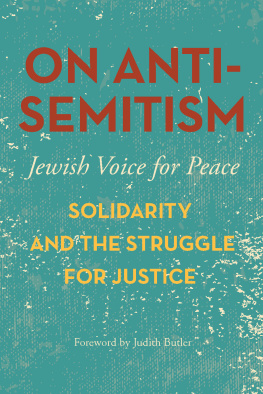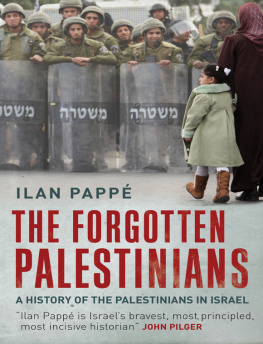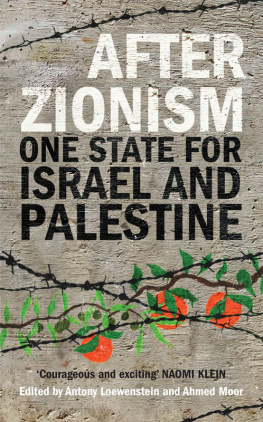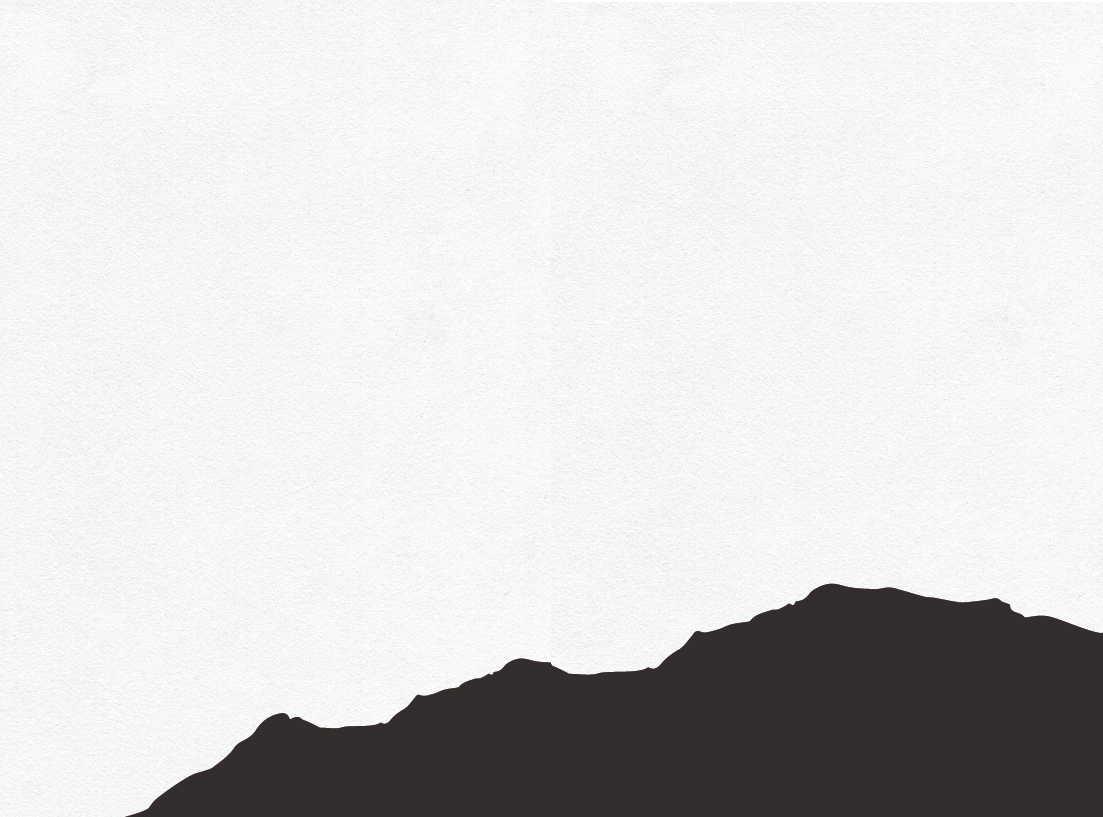Advance Praise for A Land With A People
A must-read, timely critique of political Zionism conveyed through searing, personal writings of Jews who refuse to accept Zionisms ethno-religious indoctrination and its violent manifestations, intertwined with reflections from Zionisms greatest yet oft-silenced Palestinian victims. This book is an invaluable resource in the effort to challenge the deliberate and dangerous conflation of anti-Zionism with antisemitism to silence criticism of Israel, and in understanding that the Israel/Palestine conflict is not a religious or ethnic one; it is not even a conflict, but rather an existential struggle against a racist, settler-colonial system. It is a struggle that can and must be undertaken by Palestinians and Jews together.
Huwaida Arraf
Human rights attorney & activist
This moving and reflective anthology weaves together poetry, art, history, and memoir about the impact of Zionism on the lives and communities of Palestinians and Jews of all backgrounds. It offers a path forward rooted in an understanding of a painful shared history that leads to a commitment to solidarity and justice for all people. Reading it is both illuminating and healing.
Rebecca Vilkomerson
Former Executive Direcctor, Jewish Voice for Peace
A Land With A People
A Land With A People
PALESTINIANS AND JEWS CONFRONT ZIONISM
A collection of personal stories, history, poetry, and art
Edited by
ESTHER FARMER,
ROSALIND PETCHESKY,
AND SARAH SILLS
Monthly Review Press
New York
Copyright 2021 by Esther Farmer, Rosalind Petchesky, and Sarah Sills
All Rights Reserved
Library of Congress Cataloging-in-Publication Data available from the publisher.
ISBN 978-158367-9296 paper
ISBN 978-158367-9302 cloth
Mahmoud Darwish, And We Have a Land, reprinted from The Butterflys Burden, translated by Fady Joudah.
Copyright 2007 by Mahmoud Darwish.
Translation copyright 2007 by Fady Joudah. Reprinted with the permission of The Permissions Company, LLC on behalf of Copper Canyon Press, coppercanyonpress.org.
Excerpt of Diving into the Wreck, reprinted from Diving into the Wreck by Adrienne Rich.
Copyright 1973 by Adrienne Rich.
With permission of the publisher, W. W. Norton & Company, Inc.
All rights reserved.
Cover design by Lena Ghannam
Cover art by Rachel Packer
Book design by Sarah Sills
Monthly Review Press
monthlyreview.org
54321
The Jews are a people without a country, even as their own land is in a great measure a country without a people.
REV. DR. ALEXANDER KEITH
Scottish Christian clergyman, in The Land of Israel According to the Covenant with Abraham, with Isaac, and with Jacob (1843)
I now conclude and avow that the price of a Jewish state is, to me, Jewishly unacceptable and that the existence of this (or any similar) Jewish ethnic-religious nation state is a Jewish, i.e. a human and moral, disaster and violates every remaining value for which Judaism and Jews might exist in history. The lethal military triumphalism and corrosive racism that inheres in the state and in its supporters (both there and here) are profoundly abhorrent to me. So is the message that now goes forth to the nations of the world that the Jewish people claim the right to impose a holocaust on others in order to preserve its State.
HENRY SCHWARZSCHILD
German Jewish refugee from the Nazi Holocaust who emigrated to the US in 1939. He worked in the South in the 1960s with the ACLU against the death penalty and believed that Judaism meant social justice action here and now.
To struggle is to overturn the logics of a racial regime that uses security to justify dispossession, military rule, and the denial of the most basic rights. To struggle is to begin building the future in the present, to prefigure a post-apartheid/post-Zionist society.
ROBIN D.G. KELLEY
Yes, I Said National Liberation, in Vijay Prashad, ed., Letters to Palestine: Writers Respond to War and Occupation (Brooklyn: Verso, 2016)
CONTENTS
Noura Erakat
Esther Farmer
Rosalind Petchesky Zionisms Twilight
Colonial Dreams, Racist Nightmares, Liberated Futures
Remi Kanazi
Riham Barghouti
Lynne Lopez-Salzedo
Gabrielle Spear
Abdullah Aljammal
Lama Khouri
Shirly Bahar
Dorgham Abusalim
Hala Alyan
Esther Farmer
Asaf Calderon
Kenan Jaffe
Abir Saleh
Eman Rashid
Talia Baurer
Amira Hurriya
Sara Abou Rashed
David Bragin
Nader
Sagiv Galai
Rosalind Petchesky
Susan Eisenberg
Nadia Kader
Aurora Levins Morales
Tzvia Thier
Melanie Kaye/Kantrowitz
Naomi Shihab Nye
Stefanie Fox
Mohammed Rafik Mhawesh
Mahmoud Darwish
Cara Levine and Gabrielle Spear
Jay Saper
FOREWORD
Radical Imagination and Palestine
NOURA ERAKAT
I am the daughter of first-generation immigrants from Palestine. My parents began to build their new lives in the Bay Area of California in 1975. We were immersed in a vibrant immigrant communityArab, Afghan, Chinese, Filipino, Mexican, Desi (people of or from the Indian subcontinent). I stood out, not because I was the only brown kid, but because I was the only Arab in class. In fact, the reason I retained my familys Arab tongue is because my elementary schoolteachers told my parents to speak their native language at home, and they would speak to us in English at school. I didnt know it then, but I was lucky: this immigrant haven shielded me and allowed me to live outside the debilitating shadow of white supremacy. I never wanted to be anything but my Palestinian, Arab, Muslim self.
As I saw it, my first encounters with injustice had to do with being a girl in the world. I grew up with three brothers and, for no reason besides the sheer fortune of cisgender assignment, I was responsible for social reproductionall the things that maintain domestic order, like cleaning and cooking along with my mamawithout benefitting from any of the privileges that my brothers seemed to have without limit, like playing basketball, walking to the local 7-11 to buy a bag of chips, or hanging out at the mall with friends. I refused to accept this unequal labor/privilege distribution as divine destiny. Thus began my first protests: I rebelled against my family. Though I succeeded in assigning my brothers some household chores, it was hardly equitable. I definitely never enjoyed their freedom in the public sphere, a key and enduring feature of patriarchy.

